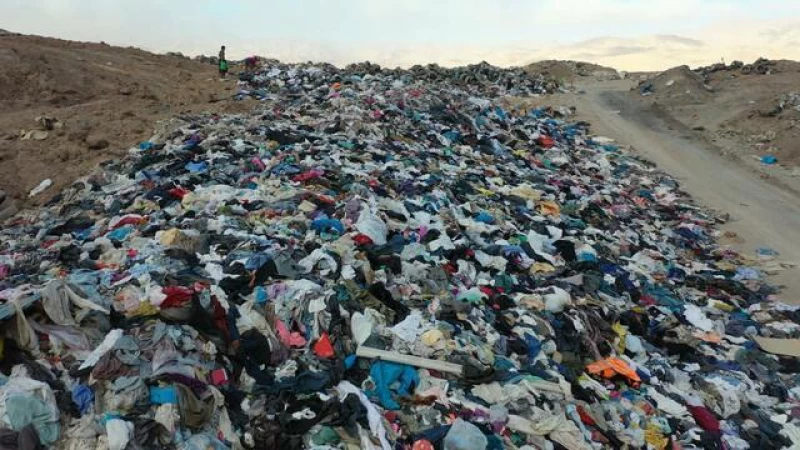Environmental Groups Urge Shoppers to Avoid Fast-Fashion
This holiday shopping season, environmental groups are asking shoppers to reconsider buying cheaper fast-fashion items that may only get a few uses. These items often end up discarded quickly, harming the environment.
In Chile, a massive landfill of used clothing from around the world keeps growing, causing damage to the environment and the communities that live there.
The mountain can be found just 30 minutes away from Iquique, a port city known for its beaches and trade. It's an illegal landfill, and one of the biggest in the area. By one estimate, there are at least 30,000 tons of waste in the pile.
"It's sad, because these clothes don't even come from here," said Angela Astudillo, who lives in Alto Hosipicio, one of the cities near the landfill.
Inside the pile were clothes made all over the world and sold in the United States, including menswear from Alabama, H&M clothing made in Pakistan, and even a graduation sash from a high school in New Jersey. The second-hand items are mostly trash, Astudillo said, and it's not the world she wants her daughter to inherit.
The Impact of Used Clothing Imports in Chile
A recent report by the United Nations reveals that Chile has received a staggering 126,000 tons of used clothing and textiles in 2021. The majority of these clothes come from the European Union, China, and the United States. However, only a quarter of these used clothes are resold, with the majority ending up in illegal landfills.
The appeal for importers to bring used clothing to Chile lies in the advantageous ports, such as those in Iquique, where little to no taxes are charged. Unfortunately, the consequence of this is that the unused clothing is often illegally dumped. Jamie Soto, the general manager of the zone, denies any involvement in the buying or selling of used clothing and claims no responsibility for the waste.
Efforts are being made by local officials to combat illegal dumping in the area. Patricio Ferreira, the mayor of Alto Hospicio, has expressed his commitment to stopping this issue. CBS Saturday Morning was shown the recently installed surveillance cameras around town, which are monitored from city hall.
In addition to the efforts of local authorities, city police are also vigilant in detecting and preventing illegal dumping. While this may be a small-scale solution, it addresses the problems caused by global overconsumption, as highlighted by Ferreira.
There is also a growing demand for changes in Chile's laws regarding the importation of used items. Similar to other Latin American countries, calls have been made for stricter regulations on what used items can be imported.
Recycling Efforts Continue to Make a Difference
Many people, like Astudillo and her daughter, are doing their part to recycle and reduce waste. They have taken it upon themselves to turn trash into new clothing, a creative way to repurpose materials that would otherwise end up in landfills. While their efforts are commendable, they acknowledge that more needs to be done to truly make a significant impact.
Meanwhile, at the port, the constant arrival of ships reminds us of the ongoing challenge we face. Despite the recycling efforts of individuals and communities, the amount of waste being generated continues to grow. It is clear that a collective effort is needed to address this issue and find sustainable solutions.






